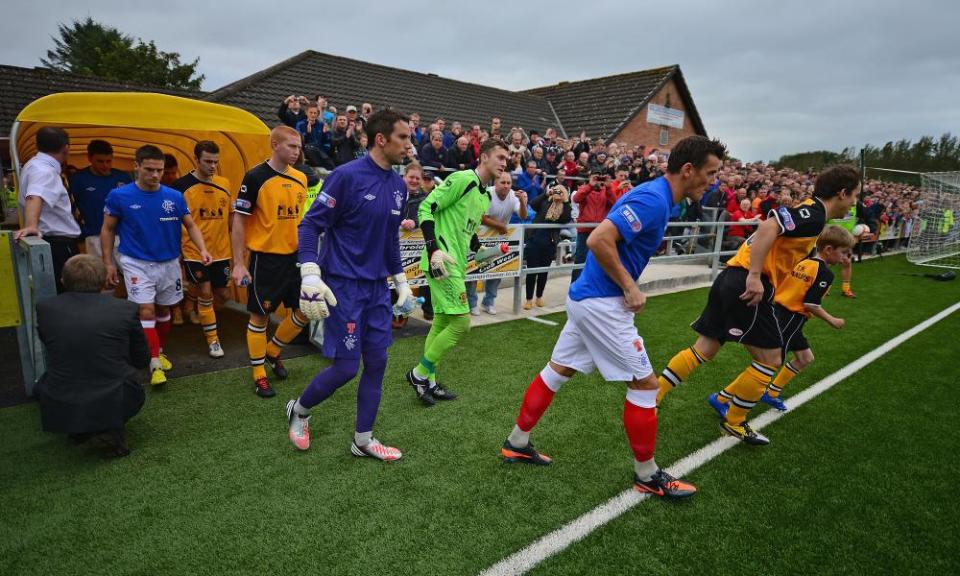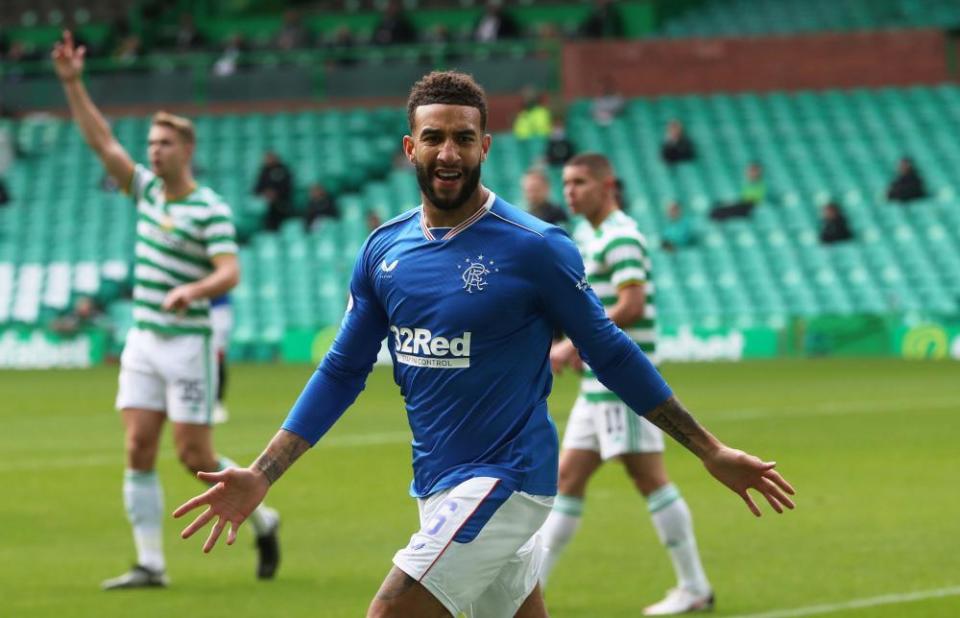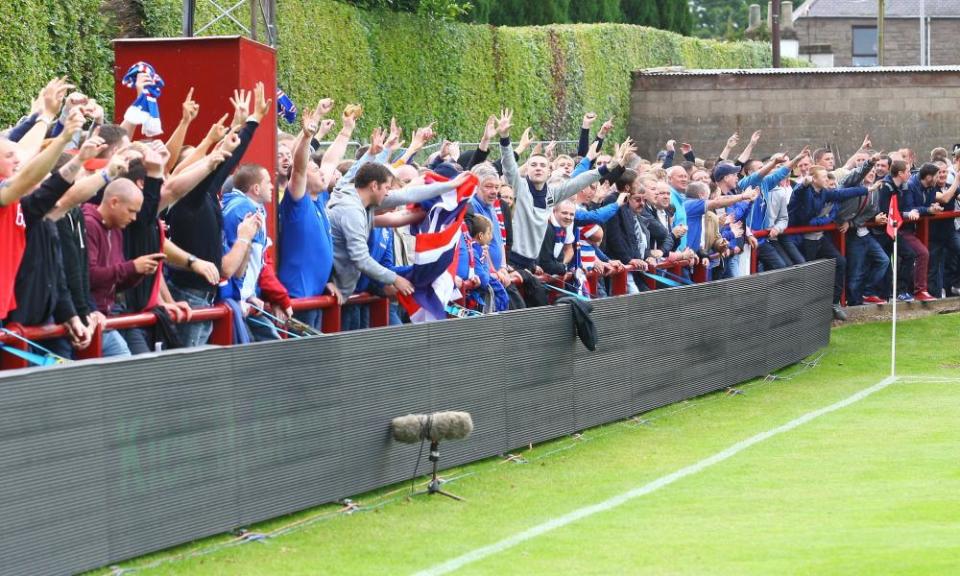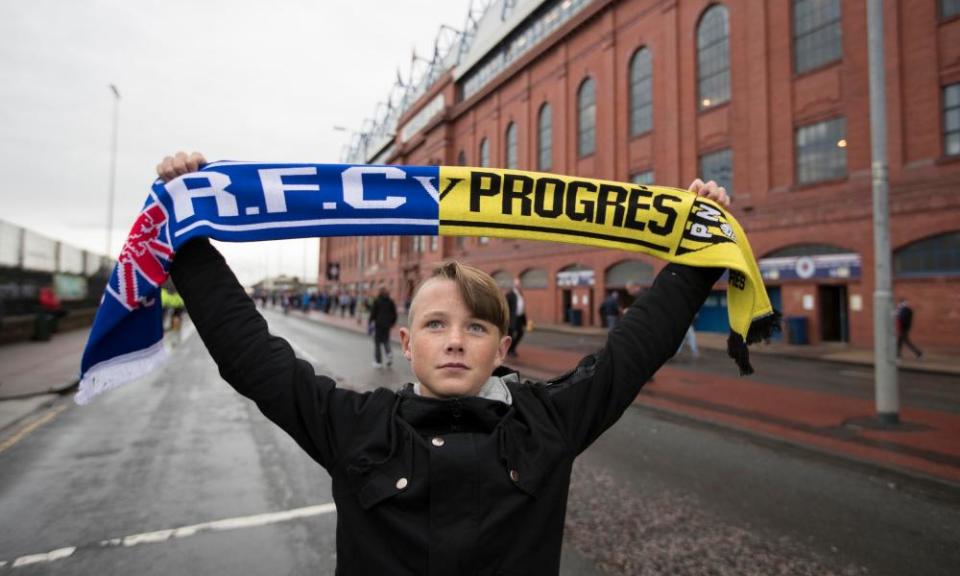'It's incomparable' – Rangers fans' journey from Brechin to another title
The Rangers championship tale cannot possibly begin with the first weekend of this season, but such was the multi-faceted nature of the club’s cataclysmic collapse that perhaps July 2012 and a Challenge Cup tie in Brechin is not a valid starting point either.
In the eyes of supporters who have looked on as Rangers – post-administration, liquidation and a level of reputational damage their worst enemies could only have fantasised over – the Premiership flag for 2020-21 absorbs years of pain. And those fans are in many ways a more fascinating case study than the players who delivered this historic moment. Following Rangers, for so long about as difficult a life option as picking wellies over sandals in a snowstorm, suddenly involved domestic drudgery against Berwick, Annan and Montrose. In the background at Ibrox sat, to put it kindly, a series of highly unconvincing characters.

“There were times where you began to think: ‘Maybe this is it,’” says David Edgar of the Heart & Hand Rangers podcast that attracts 200,000 listeners to two shows a week. “It sounds ridiculous but if you said the same to Aberdeen fans in 1985, it would have seemed ridiculous to them.
“We didn’t want to hear it at the time and people forget but Dave King [later Rangers’ chairman] said just before it all happened that there would be administration and liquidation. He also said the blows to the club were so serious that it would take 10 years. Who wants to hear ‘10 years’ at that point? You don’t want to take that in.

“This is the 19th time I’ve seen us win the league. It’s incomparable to any of those. This one is so different because of where we have been. We have lost a lot of people in 10 years. We came close to losing our club a few times, including spiritually. The pilot light nearly went out.”
There is always “the moment”. For Jonathan Watson, a Rangers supporter best known in Scottish football circles for his starring role in the BBC’s cult Hogmanay series Only an Excuse?, it arrived as the team sheets landed for October’s Old Firm fixture. “I hadn’t been confident at all at the start of the season,” Watson says. “I looked at the Rangers subs that day and for the first time thought: ‘Wait a minute, we have a better bench than they’ve got.’” Rangers went on to win 2-0 at Celtic Park.
Related: How the mighty Glasgow Rangers have fallen
Like Edgar, Adam Thornton was in Brechin for that 2012 cup tie. Rangers were the champions in the summer of 1994 when, aged eight, he collected his first Ibrox season ticket. Another 10 titles – and multiple other honours – arrived until Rangers’ 54th, and hitherto last, in 2011. “I think everybody thought when this one came along, it would be another nail-biter,” Thornton says. “Since 2 January I have made peace with myself; it’s happening. In a way when you gear yourself up for a while, you have been celebrating a little bit already. It’s huge, the most important of my lifetime and you could argue in the club’s history.” Thornton references “scar tissue” attached to events since 2012; and no wonder.
“It’s not just a case of coming back, it’s about all the charlatans that there have been along the way,” Watson says, adding that what the club have gone through to get back to winning the title is “why it means so much more. I also think it will mean a great deal to those players; one thing the management have done is show what it means to the people who come and support them. This is a huge achievement for everyone.”
Nine years ago, Rangers supporters were consumed by anger. The intervening period distorts what precisely that related to but a sense of unjust treatment – by their own board, by football authorities, by other clubs – was once a fundamental theme. With Rangers as champions, revenge lies somewhere in the mix.

“We understood that we were hated as the biggest club, we get that,” Edgar explains. “That’s fine. Have a laugh at our expense, absolutely. That summer – and people lost friendships because of this – it went beyond banter. People genuinely wanted Rangers to die. Other football fans, who know how important their club is to them, wanted to take that away from us. We found that too much, it crossed the line. It was cruel. Turn up at games waving tenners by all means but actually saying: ‘It would make me happy to see you lose this thing that means so much to you’? We as supporters were victims.”
Including during match days. Time-honoured rivalries created to varying degrees with Celtic, Aberdeen and Hibernian were placed into cold storage. “How do you recreate that against Stenhousemuir?” Edgar asks. “It’s like bullying. We have guys running about out there on 10 grand a week. How can you talk down to others? You feel like the much bigger kid playing football with the primary threes. Your options were boring, unenjoyable, unfair football … or humiliation. Not great. The novelty wore off quickly. It was a jail sentence we just had to get through.”

The League One campaign in 2013-14 is a case in point. “We went unbeaten but you wouldn’t really have known it from general perceptions,” Thornton says. “It had become a slog.”
He shivers when recalling the 1-0 Challenge Cup final defeat by Raith Rovers in April 2014. “We were crying out for any bit of success. You couldn’t really see any way out at that point.”
By early 2017, Rangers were back in the top flight but suffered huge European embarrassment at the hands of Progrès Niederkorn. “I was doing a play in Birmingham and listened on the radio,” says Watson. “Pumped by the might of Luxembourg.” Watson later called his friend Phil Differ, a Celtic-supporting Scottish comedy writer. “He picked up and just couldn’t stop laughing.”

That, of course, is a harmless side of a routinely bitter Glasgow rivalry that many don’t see. The reason smiling is the best option is that success for Old Firm clubs is cyclical. Celtic are only now being reminded of that. “When I was at school Celtic were winning the European Cup and going for nine titles in a row,” Watson says. “I remember going to Easter Road in 1975, Rangers ‘won’ one each and that stopped the run. It’s all part of the Old Firm seesaw.
“When it’s your team, it’s fine. But if you are brutally honest and take an overview, it’s not healthy for the game in Scotland [to have these title-winning sequences]. Then again, you look at leagues around Europe now – England is an exception – and it’s so often between two or three teams.”
Stark improvement in Rangers’ recruitment has been key to success. Watson delivers typically sharp humour when illustrating how both halves of the Old Firm used to shop in familiar markets but the underlying point is a serious one. “Nowadays, not only have you not heard of the player but you haven’t heard of the club they’ve come from either,” he says. “Encyclopaedic knowledge of Charles Buchan’s Football Monthly and you’re still struggling.”
Related: Steven Gerrard had to embrace the pressure to turn Rangers around | Ewan Murray
Crucially, the Rangers support has a squad with whom they can connect. It wasn’t ever thus. Basic though it may sound, fans like their team again. “People talk about footballers being overpaid; there were never footballers as overpaid as the ones in the Third Division for Rangers,” Edgar says. “There were guys playing for the club you felt no connection with. There were people running the club you actively despised. Beyond the stadium, the badge, the fans this wasn’t a big team. There was nothing there to indicate that.”
Thornton concurs. “This is the best version of Rangers I have seen since Dick Advocaat [manager from 1998-2001] with the style of football, the success in Europe, outstanding players in every position,” he says. “I remember watching Rangers in Europe and we couldn’t get a kick of the ball. Now we are dominating Benfica for large parts of a game.”
The jibes from Celtic’s contingent won’t abate. That wouldn’t be natural. One remains constant. “‘Your club died,’”says Edgar with a smile. “Well, in that case it took nine years for this club to beat you. Is that better?”
At a point in the future, packed stands at Ibrox will hail the group who broke Celtic’s spell. “I’ve sat next to my dad since 1994 but haven’t watched a game with him for a year,” Thornton says. “You take for granted that you visit this place once a fortnight for most of your life. Adding a title win to that means it will be a special day.” It is hardly football cliche to suggest this really is for the masses.

 Yahoo Finance
Yahoo Finance 